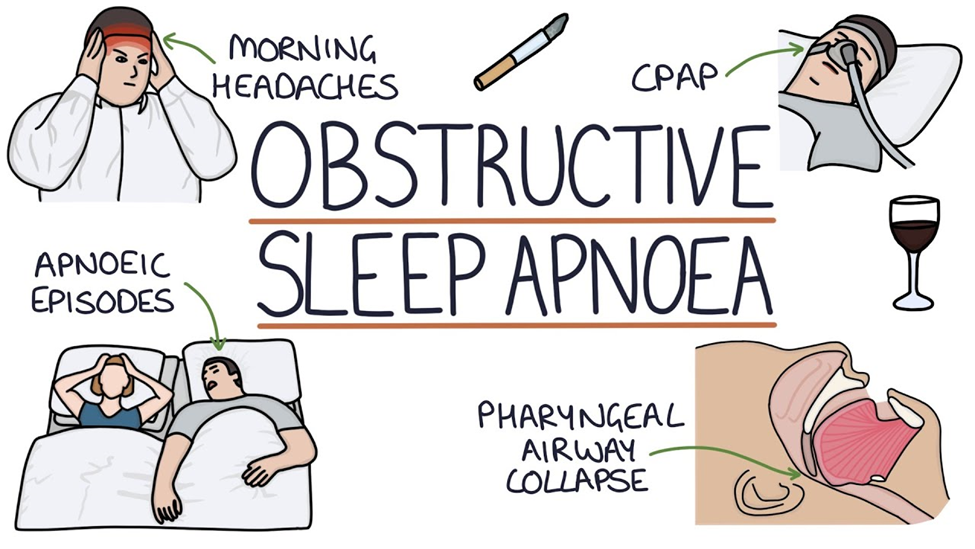A nurse is collecting data on a client who has obstructive sleep apnea. Which of the following findings should the nurse expect?
Constipation
Nausea
Headache
Hypotension
The Correct Answer is C
A. Constipation
Constipation is not typically associated with obstructive sleep apnea. However, sleep disturbances and certain medications used to manage OSA may indirectly contribute to constipation in some cases.
B. Nausea
Nausea is not a common symptom of obstructive sleep apnea. While sleep disturbances may affect gastrointestinal function in some individuals, nausea is not a typical manifestation of OSA.
C. Headache
One of the common findings associated with obstructive sleep apnea (OSA) is headache. This occurs due to the repeated episodes of apnea (cessation of breathing) during sleep, which leads to intermittent hypoxia (low oxygen levels) and subsequent cerebral vasodilation. The vasodilation can trigger headaches, often described as morning headaches, upon waking up. These headaches are typically frontal and may be accompanied by other symptoms such as fatigue and irritability.
D. Hypotension
Hypotension (low blood pressure) is not a typical finding in obstructive sleep apnea. In fact, individuals with OSA are more likely to have hypertension (high blood pressure) due to the effects of repeated apnea episodes on the cardiovascular system, such as increased sympathetic activity and arterial stiffness.

Nursing Test Bank
Naxlex Comprehensive Predictor Exams
Related Questions
Correct Answer is ["A","C","D","E"]
Explanation
Correct Answers:
A. Frequent oral hygiene is necessary:Steroid inhalers can increase the risk of oral thrush and other infections, so maintaining good oral hygiene is essential to minimize this risk.
C. Rinse and spit after inhalation of the medication:Rinsing the mouth and spitting after using a steroid inhaler helps to remove residual medication and reduce the risk of developing oral thrush.
D. When taking a steroid drug as well as a bronchodilator, the bronchodilator should be administered first:Administering a bronchodilator first helps open the airways, allowing the steroid medication to reach deeper into the lungs for more effective treatment.
E. Hold your breath for 10 seconds during inhalation of the medication:Holding the breath allows for better medication absorption in the lungs.
Incorrect Answer:
B. The inhaler should be used on a PRN basis only:Steroid inhalers are typically used on a regular schedule for long-term control of asthma or other respiratory conditions, rather than on a PRN (as needed) basis. PRN use is more applicable to rescue inhalers, like short-acting bronchodilators.
Correct Answer is ["B"]
Explanation
A. 24-year-old woman with allergic rhinitis:
Likely safe to take an alpha-adrenergic decongestant as allergic rhinitis is a common indication for decongestant use in young, healthy individuals.
B. 18-year-old man with cold symptoms:
Likely safe to take an alpha-adrenergic decongestant as it's a common indication for decongestant use in young, healthy individuals.
C. 64-year-old woman with a history of heart disease:
Should avoid alpha-adrenergic decongestants due to the risk of increasing blood pressure and potentially worsening heart conditions.
D. 70-year-old woman with glaucoma:
Should avoid alpha-adrenergic decongestants due to the risk of exacerbating glaucoma by causing pupil dilation and increasing intraocular pressure.
E. 56-year-old man with prostatic hypertrophy:
Should avoid alpha-adrenergic decongestants due to the risk of worsening urinary symptoms caused by prostatic hypertrophy, such as urinary retention.
Whether you are a student looking to ace your exams or a practicing nurse seeking to enhance your expertise , our nursing education contents will empower you with the confidence and competence to make a difference in the lives of patients and become a respected leader in the healthcare field.
Visit Naxlex, invest in your future and unlock endless possibilities with our unparalleled nursing education contents today
Report Wrong Answer on the Current Question
Do you disagree with the answer? If yes, what is your expected answer? Explain.
Kindly be descriptive with the issue you are facing.
